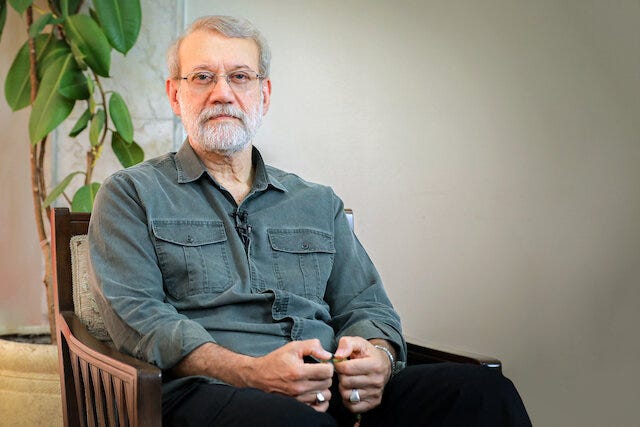Iran’s Security Chief: “Iranians Are Not a People Who Surrender”
Ali Larijani outlines national security priorities, resistance strategy, and Iran’s stance on nuclear talks amid fragile ceasefire
Tehran, PUREWILAYAH.COM - In his first major interview since assuming the role of Secretary of Iran’s Supreme National Security Council, Ali Larijani delivered a wide-ranging assessment of the Islamic Republic’s security strategy. Speaking against the backdrop of a fragile ceasefire following a 12-day conflict with Israel, Larijani declared that “Iranians are not a people who surrender,” emphasising national resilience in the face of military, diplomatic, and economic pressures.
Ceasefire and National Cohesion
Larijani described the Council’s primary duty as managing crises in a way that preserves stability and allows for national development. He credited national unity during the war as a decisive factor:
“Despite differing views, Iranians agreed they must defend the country. This cohesion is a national asset and must be safeguarded.”
He stressed that maintaining people’s livelihoods, even in wartime, is critical for endurance, while also highlighting the need to strengthen military capabilities and address weaknesses exposed during the conflict.
Military Preparedness and Defence Council
Acknowledging tactical shortcomings, Larijani revealed that a new Defence Council has been established to improve Iran’s armed forces and develop modern warfare capabilities. He noted that Iranian missile and aerospace forces had “broken the enemy’s back,” while new investments are being made in radar, air defence, and indigenous technology with support from the country’s universities and experts.
Diplomacy and Nuclear Talks
Despite harsh criticism of Western powers, Larijani rejected the idea of abandoning diplomacy:
“Iran should never abandon diplomacy. But negotiations must be real — not a theatre for justifying new aggression.”
On the snapback sanctions mechanism, he accused European powers of siding with Washington in a “tragic violation of international law,” arguing that Iran cannot accept indefinite extensions beyond the terms of the 2015 nuclear agreement. Withdrawal from the Nuclear Non-Proliferation Treaty (NPT), he said, remains a theoretical option, though not current policy.
He strongly criticised the International Atomic Energy Agency (IAEA), accusing Director-General Rafael Grossi of “surrendering to Israel and the US” by failing to condemn attacks on Iranian nuclear sites.
Resistance Movements and Regional Policy
Larijani defended Iran’s long-standing support for the Resistance Front, including Hezbollah, Hamas, and Ansarullah in Yemen, rejecting calls for their disarmament:
“Resistance is not created by Iran; it is created by occupation and oppression. We support it because it is an authentic regional movement and an asset.”
He argued that Western and Israeli pressure has only deepened regional resistance and warned that attempts to impose “peace through force” would only fuel instability.
Relations with Russia, China, and Neighbours
Larijani said ties with Russia and China remain strong across political, military, and economic fields, though each country pursues its own interests. He dismissed Western criticism of these partnerships, saying Iran had no choice but to diversify alliances after years of sanctions.
On the Armenia–Azerbaijan agreement, he acknowledged regional risks but said Tehran had received assurances that vital transport routes would not be blocked. While emphasising vigilance, he noted Iran currently has no evidence of Azerbaijani involvement in Israeli military operations against Tehran.
Media, Public Confidence, and Leadership
Larijani called for strengthening Iran’s media strategies, urging more concise and credible communication to counter propaganda. He warned against spreading falsehoods, saying trust must be preserved:
“If you cannot reveal details, say so honestly. But never lie.”
He praised the strategic guidance of Supreme Leader Ayatollah Ali Khamenei during the war, comparing his composure to that of Imam Khomeini:
“His steps are taken with complete assurance — this is the characteristic of leaders who traverse the divine path.”
Focus on the People
In conclusion, Larijani emphasised that the greatest national priority remains meeting the needs of the Iranian people amid sanctions and wartime pressures.
“The fact that people face problems in meeting their basic needs is more agonising than anything else and must be resolved. Factories must not lie dormant. This is where our collective focus must lie.”
Analysis:
Larijani’s remarks reflect a dual strategy of resistance and diplomacy: projecting strength through military deterrence while keeping negotiations open, but only on Iran’s terms. His call for internal cohesion, economic resilience, and media credibility underscores Tehran’s recognition that enduring external pressure depends on domestic unity. (PW)
Source: The Official Website Of Ayatollah Khamenei


